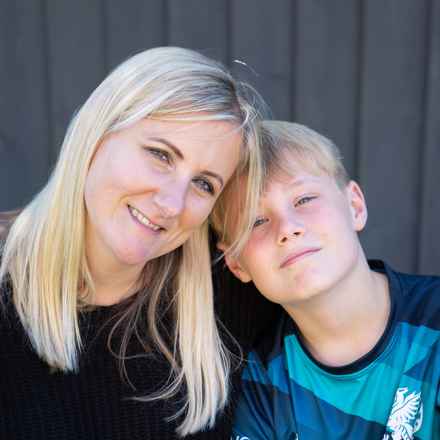“I hope Archie will never have to worry about losing his sight”
Posted: Monday 11 November 2024
When Sian was first diagnosed with Best disease, a rare genetic eye condition, she was just a child. She barely remembers the details, only that she got a day off school and visited the Tower of London. Decades later, the condition she had almost forgotten about resurfaced - this time, affecting her young son, Archie.
“I took him for a routine eye test – he was seven and a half at the time. ‘Don’t panic,’ the optician said. But we were urgently referred to the hospital. They looked at the back of his eyes, ran all sorts of tests, and then said, ‘Is there something in the family?’ And that was the lightbulb moment.”
Archie had Best disease too.
“I really wasn’t prepared for it,” Sian admitted. “I knew I had macular disease, but I never even thought about passing that gene on to my children.”
The hospital told Sian that her daughter, Summer, was also likely to be carrying the gene but is not currently showing any symptoms.
Sian said: “She’s not had any symptoms yet. But Archie has. How long will it be before he starts losing his sight?”
Sian's sight
When visiting the hospital with Archie, the consultant asked Sian about her own eye health.
“I told her I have really bad migraines, which I’ve had all my life,” she said. “I get flashing lights with a migraine, but actually they were constant—the flashing lights, I couldn’t shift them. I just put it down to stress, but she told me to go to the optician for a check-up.”
When she had her eyes tested, she was devastated to hear her own eyesight had deteriorated, and her visual acuity was borderline for driving.
“It hit me like a tonne of bricks,” she said. “I’d been so focused on Archie; I’d completely forgotten about my own eye health.”
“I was referred to the hospital, where the consultant said: ‘The lights you’re experiencing aren’t migraines, it’s the macular disease. There’s not really much we can do. You’ll end up with big black spots in your eyes, and you will lose your central vision.’”
'I thought my life was over'
She added: “I walked out of that clinic, thinking that my life was over. But then I kept thinking about Archie.
“Our OCT scans were almost identical, and I wonder if the way I’m seeing the world, with my eyes, is how he’s seeing the world, and if he’s got any blurred vision. I can’t sit wallowing and feeling sorry for myself, because that would make him worry.”
Talking about Archie, Sian said: “He’s a little lightning bolt. He’s not interested in gaming, like some of his friends. He’s playing football, or cricket, running around, always outside on his bike, or a scooter. If there’s something to jump off, he’ll jump off it. He’s just one of those really busy, active children. That will all change if he can’t see.”
“The research gives me hope”
In the face of uncertainty, Sian has found hope in funding medical research.
“I keep thinking, by the time Archie gets to 40, the world will have completely changed," she said.
"When I was nine there were no iPhones; the world was so different. Medical science is improving the quality of life for everyone. Maybe it can change Archie’s life; maybe mine. For my son, for our children’s children, if there’s anything we can do to stop this, we absolutely must do it.”
Please help families like Sian’s by giving today. You can fund the research that will find a cure for macular disease.
Support for you
We provide free information and support to those with macular disease, along with their family and friends, to help people keep their independence.
Explore our research
Beating macular disease through funding medical research and improving the lives of those living with macular disease.




